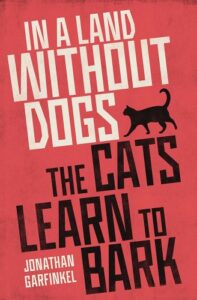
Jonathan Garfinkel, In a Land Without Dogs the Cats Learn to Bark
In a Land Without Dogs the Cats Learn to Bark by Jonathan Garfinkel. A clear-eyed, elucidating novel of the aftermath of the Soviet Union and the era’s devastating effects on lost, wandering lives. A great read.
–Rawi Hage, author of Stray Dogs and Other Stories
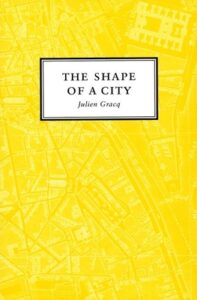
Julien Gracq, The Shape of a City
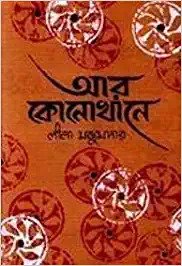
Leela Majumdar, Aar Konokhane
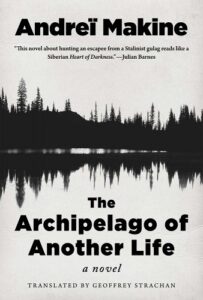
André Makine, The Archipelago of Another Life
I found Julien Gracq’s book quite by chance, as you might a friend with whom you sense an immediate affinity. The Shape of a City (La Forme d’une ville, translated by Ingeborg M. Kohn) had been left behind by some previous writer at a residency in France where I happened to be, and from its first line, “The shape of a city, as we all know, changes more rapidly than the heart of a mortal,” I was captivated by its blend of poetry, philosophy, history, observation and feeling.
Though it is about Nantes in the 1920s, it became my guide in a very literal way too: I followed in the footsteps of the author to eat at the ornate brasserie in Nantes, La Cigale, designed by a ceramicist called Émile Libaudière, and in Paris I went to the Musée Gustav Moreau, which Gracq mentioned as one of his favorites. It was as he describes, somewhat like a haunted mansion—room after room of the artist’s astonishing work, the rooms pinioned by an extraordinary spiral staircase.
My two other discoveries this year were the Bengali writer Leela Majumdar’s “Aar Konokhane” (Elsewhere) with radiant accounts of her wartime childhood in the Himalaya. And André Makine’s Archipelago of Another Life, about an insanely gripping journey across Stalin’s Siberia, simultaneously a fable, thriller, political statement and love story. It made me buy his other books in translation as soon as I could.
–Anuradha Roy, author of The Earthspinner
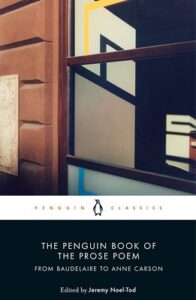
The Penguin Book of the Prose Poem, edited by Jeremy Noel-Tod
I found The Penguin Book of the Prose Poem expansive and provided some comfort that the indefinables of language, thought, and time remain so.
–Michael Salu is an artist and writer
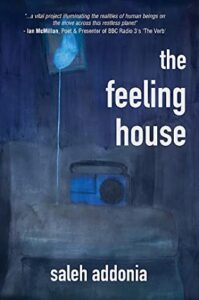
Saleh Addonia, The Feeling House
After learning Korean fifteen years ago, my linguistic relation to pronouns, especially ‘she’,’he’, ‘they’ and ‘we’, transformed radically. My literary relation to these pronouns, though, would only transform after reading “She’s a Country” in Saleh Addonia’s collection of short stories The Feeling House. Especially ‘she’ and ‘we’ are unforgettable.
–Adania Shibli, author of Minor Detail, translated by Elisabeth Jaquette

《歧路行》Qi Lu Xing/Taking the Branch Road by Bei Dao 北岛
In the East, the act of writing is easily distorted by power (or we could say politics). Bei Dao has consistently refused to be tamed; like Don Quixote, he wages battle against these forces alone. Taking the Branch Road is his longest work yet, and may be one of his final offerings. In this epic poem, Bei Dao writes “what departs is the ocean what returns is the foam/ what departs is the spring river what returns is the bare river bed/ what departs is the clear sky what returns is the arrow’s twang.” With such desolate yet undaunted lines, like a prophecy, he attempts to strike the gong of the human soul.
–A Yi, author of A Perfect Crime, translated by Anna Holmwood
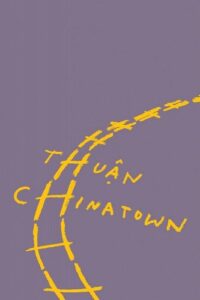
Thuân, Chinatown
I know I’m in for a good time whenever I open a book and see there are no paragraph breaks, and this was indeed the case with Chinatown. A dreamlike meandering through family history, displacement and language, in Nguyễn An Lý’s joyously fluid translation, Thuân’s unmoored narrator lets her mind roam even as her body remains trapped in so many different ways. Choosing to remain largely silent in her Parisian existence for fear of seeming “too Southeast Asian-y,” she can only be free in her thoughts. A feat of imagination.
–Jeremy Tiang is a writer and translator, his latest work is Xu Zechen’s Beijing Sprawl, co-translated with Eric Abramsen, forthcoming in 2023 from Two Lines
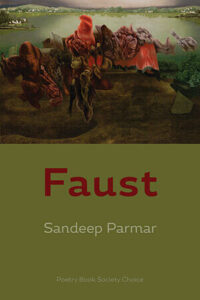
Sandeep Parmar, Faust
I read Sandeep Parmar’s new book Faust which led me to reread her two previous poetry collections. I see them as a triptych, a bold and inventive exploration of history, exile, memory, and racism in three volumes. For a striving Faust, Parmar casts a migrant who flees a post-colonial legacy of climate destruction for a life of eternal striving. The book begins with an invocation and is full of avant-garde spells as family history throws its chaotic waves onto the impenetrable walls of imperial narratives.
All three of Parmar’s books describe migrant experience in haunting ways. “We arrived with one steel pot, a bag of lentils and an onion”—this onion harvested in her first book, The Marble Orchard, is planted in Faust: “These potatoes, these onions, I have planted for centuries. And you bring me Englishman for a husband.” All three books are full of marriages that bring uprootings (her second book, Eidolon, recasts Helen of Troy, exiling her in the USA). In Faust, the mythological, feudal, patriarchal language of progeny used widely in the first two books erupts into fierce and heartbreaking poems of miscarriage.
I was greatly moved by how the book embodies striving in its form, how striving takes it beyond the constraints of the genre: along with poetry, Faust includes an essay on the poetry of miscarriage, along with an essay about Ulysses Syndrome—a stress-induced disorder observed in migrants. It’s full of voices—scholars, poets, dead and living, family members. There’s a metaphor Parmar extends through all three books: gemstones, speech, exile. Trace it as you read: it shines with intelligence and deep emotion.
–Valzhyna Mort, author of Music for the Dead and Resurrected
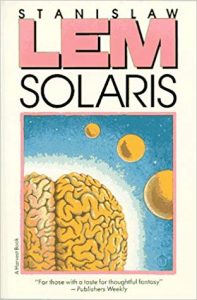
Stanislaw Lem, Solaris
My most memorable reading experience this year was the new and updated translation to Norwegian of Polish author Stanislaw Lem’s novel Solaris from 1961. A seminal work of sci-fi literature, it tells the story of psychologist Kelvin who travels to a space station orbiting the oceanic surface of the mysterious planet Solaris, which might be an entity in itself and which is able to materialize simulacra onboard the station.
This, as it turns out, is pretty bad news for both the crew and everyone who has devoted their lives to studying Solaristics in a futile attempt to understand it and learn to communicate it. They don’t write ‘em like this anymore.
–Johan Harstad, author of Red Handler, translated by David Smith, forthcoming from Open Letter in 2023
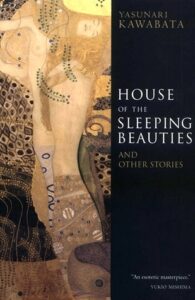
Yasunari Kawabata, House of the Sleeping Beauties and Other Stories
For centuries, writers have been expected to operate under the principle that less is more & to adhere to the power of subtlety. Though this may have produced great art, it might have also inversely led to a loss. This thinking was at the top of my mind when I read books considered by some to be the fruits of “perverted & weird imaginations.” One was House of the Sleeping Beauties and Other Stories, by Yasunari Kawabata, first published in 1961. With spare, beautiful prose, Kawabata boldly probes the boundaries to examine sexuality and human psychology and, in the process, produces a chilling work of art.
–Sulaiman Addonia, author of Silence is My Mother Tongue
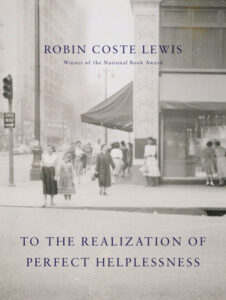
Robin Coste Lewis, To the Realization of Perfect Helplessness
This was a stellar year for books and reading, and there’s been much to love—but I was especially grateful to have Robin Coste Lewis’s exquisite and much anticipated To the Realization of Perfect Helplessness land on my desk just before year’s end. Part poetry collection, part photo album and archive, part documentary, and part, as Lewis puts it, “a film for the hands,” this sui generis book defies genre in documenting and celebrating intimate family history while simultaneously re-envisioning cultural narratives about race, exploration, terror, and migration. Lewis’s ingenious pairings of text and images illuminate the figures in the photographs while also exposing what’s aloft in the air surrounding them. This is an essential book, and one to treasure.
–Deborah Landau, author of Skeletons, forthcoming in 2023 from Copper Canyon



